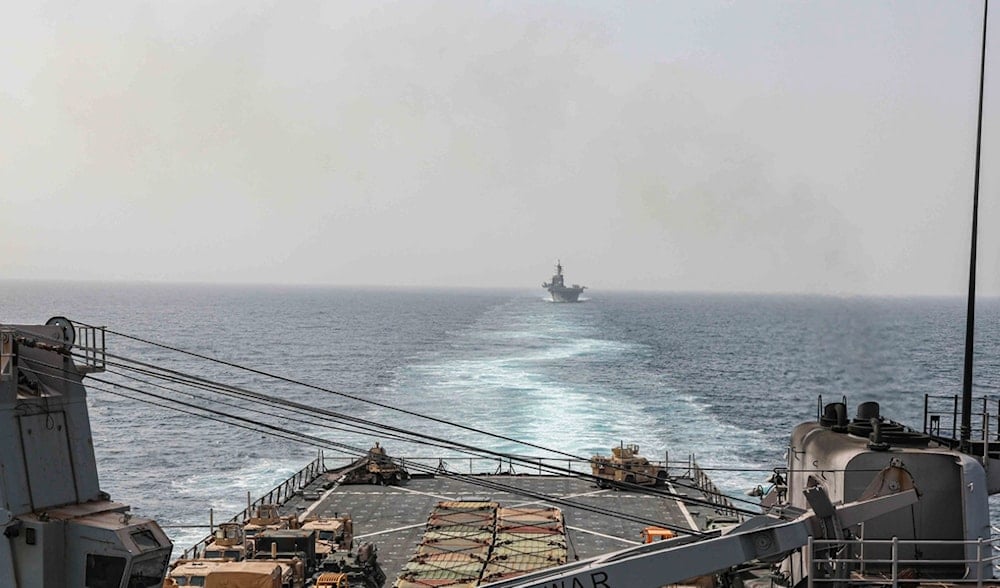Without US to the rescue, 'Israel' would be dealt a severe blow: INSS
Frustration with "Israel's" actions further complicates the Biden administration's response during the election campaign.
-

In this image provided by the US Navy, the amphibious dock landing ship USS Carter Hall and amphibious assault ship USS Bataan transit the Bab al-Mandab Strait on August 9, 2023. (AP)
The "Institute for National Security Studies" (NDSS) published in a new post on X that following the Israeli occupation's assassination of Hezbollah leader Fouad Shokor in Beirut and Hamas leader Ismail Haniyeh in Tehran, the US has bolstered its regional presence anticipating imminent Iran and Hezbollah retaliatory attacks.
"The US administration decided to significantly increase its forces in the region, including deploying additional aircraft carriers, vessels, and pilots," the INSS wrote.
The assessment cited spokespersons of the administration who have stressed that "the purpose of the forces is to deter Iran and protect Israel, similar to the actions taken on the evening before the Iranian attack on April 14."
The Strengthening of American Forces in the Region: Implications
— INSS (@INSSIsrael) August 4, 2024
Researchers Eldad Shavit and Chuck Freilich write:
Following the threats of Iran and Hezbollah to respond to the assassinations of Hezbollah leader Fuad Shukr in Beirut and Hamas leader Ismail Haniyeh in Tehran,… pic.twitter.com/SdRLzGxmqF
Additionally, the INSS reported that the spokespeople have noted that Washington has no intention of escalating the situation and reiterating what the US has formerly claimed: "Only a deal to release the hostages will initiate a process of de-escalation, including between Israel and Hezbollah."
INSS further claimed that the significant reinforcement of US forces is primarily aimed at deterring and protecting "Israel". The Institute then underscored that "however, the impression is that it stems from the concern that without American protection, Israel would suffer a severe blow, which would compel it to respond."
A "significant blow" to Tel Aviv could then prompt a an Israeli response and consequently radically pull the US into a direct confrontation with the Axis of Resistance through the need to expand it involvement significantly and "possibly to the point of a direct response against Iran."
INSS added that "assuming that Tehran will not be deterred, it seems that the massive military deployment is intended to minimize as much as possible the risk that Iran landing a blow that would force Israel to respond harshly and put the United States in a dilemma of how to act."
Frustrated or not, US remains committed to defend 'Israel'
From the American perspective, if an Iranian response is thwarted, "Israel" would likely refrain from retaliating, thus containing the situation. Despite the Biden administration's commitment to supporting "Israel", INSS stressed that "all reports indicate that anger and frustration with Israel’s conduct is increasing."
Additionally, INSS claimed that the US is engaged in the Israeli occupation's internal strife, attempting to hold the occupation's PM independently responsible for the failure to reach a deal for a ceasefire.
INSS wrote that "even though the US administration does not currently blame Israel for delaying the deal, leaks suggest that Prime Minister Netanyahu is also seen as responsible."
Moreover, INSS explained that the Biden administration faces a dilemma in responding to "Israel" due to the ongoing US election campaign. The collapse of the strategic plan to end the war, personally spearheaded by President Biden, has left the administration without an alternative strategy, said the INSS.
If the US is drawn into greater military involvement in the Middle East during the final stretch of a turbulent election campaign, the blame is likely to fall on "Israel", potentially influencing the election's outcome.
Read more: Iran rejects calls to tone down Haniyeh's assassination response: WSJ

 3 Min Read
3 Min Read










